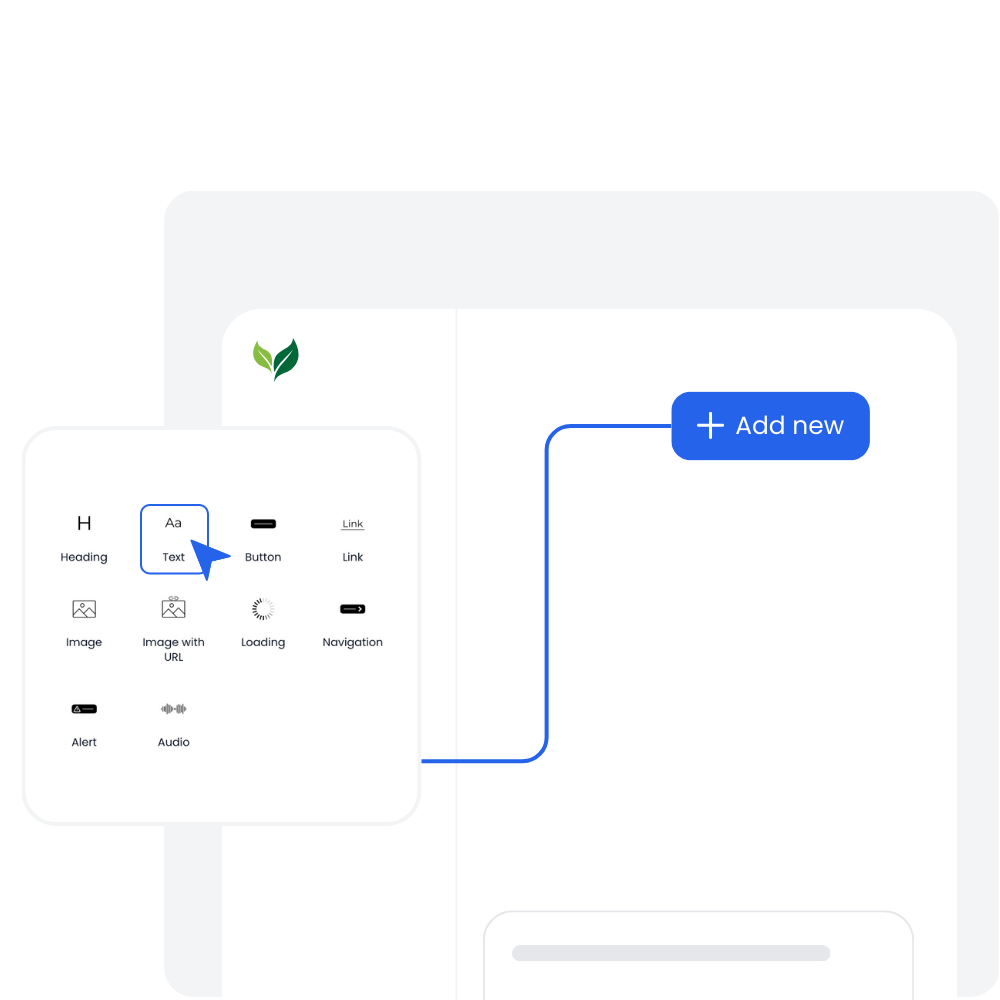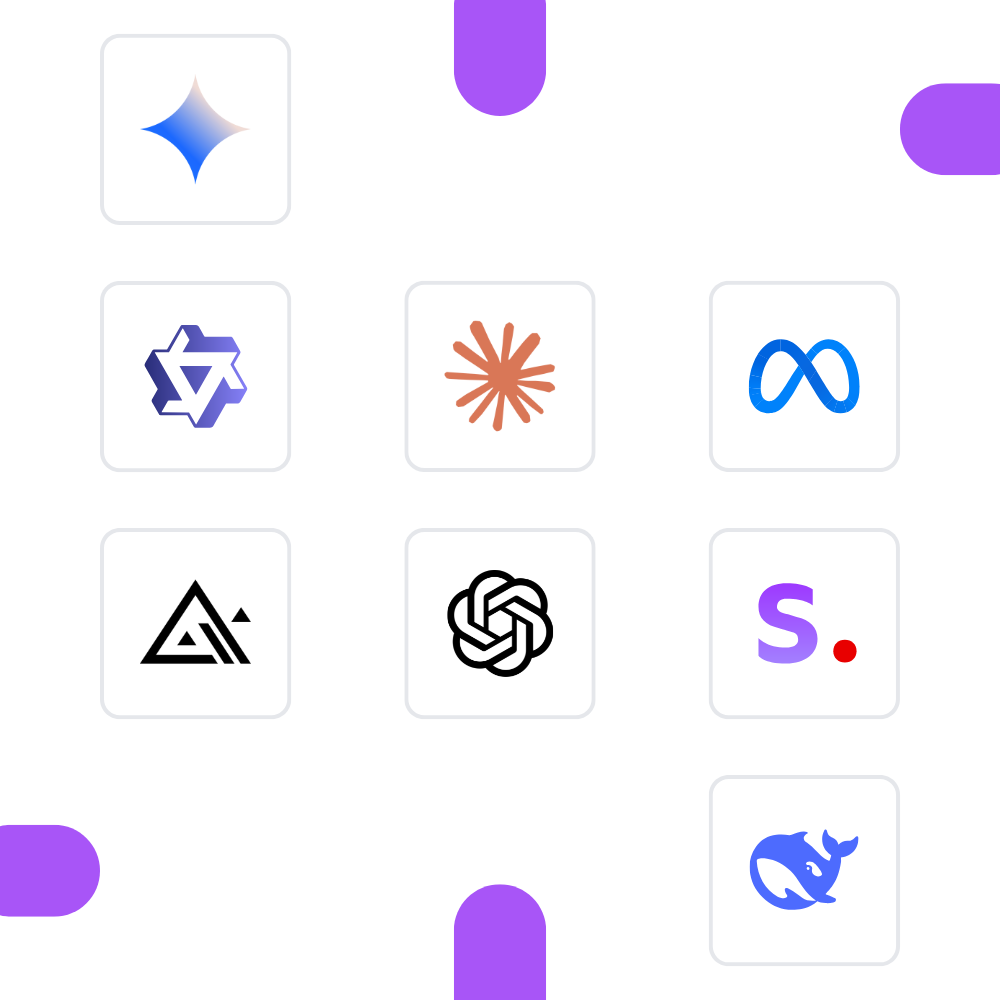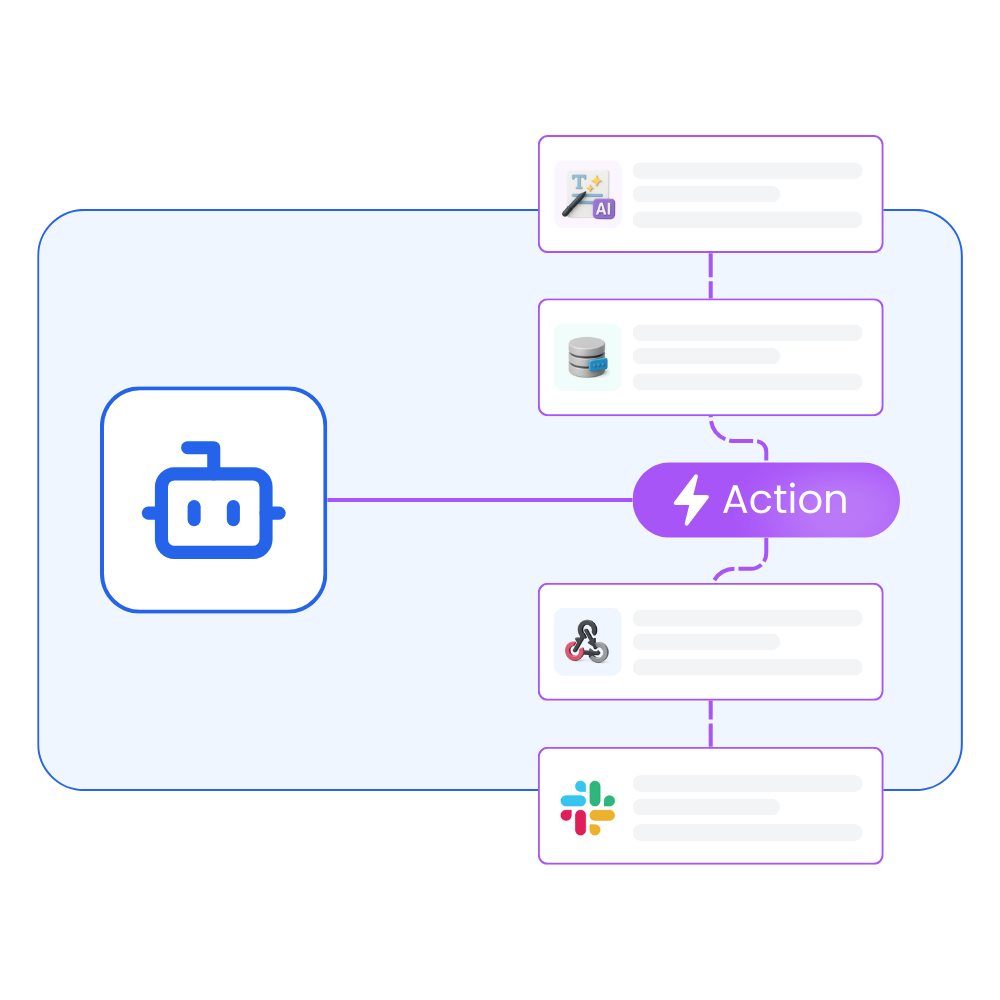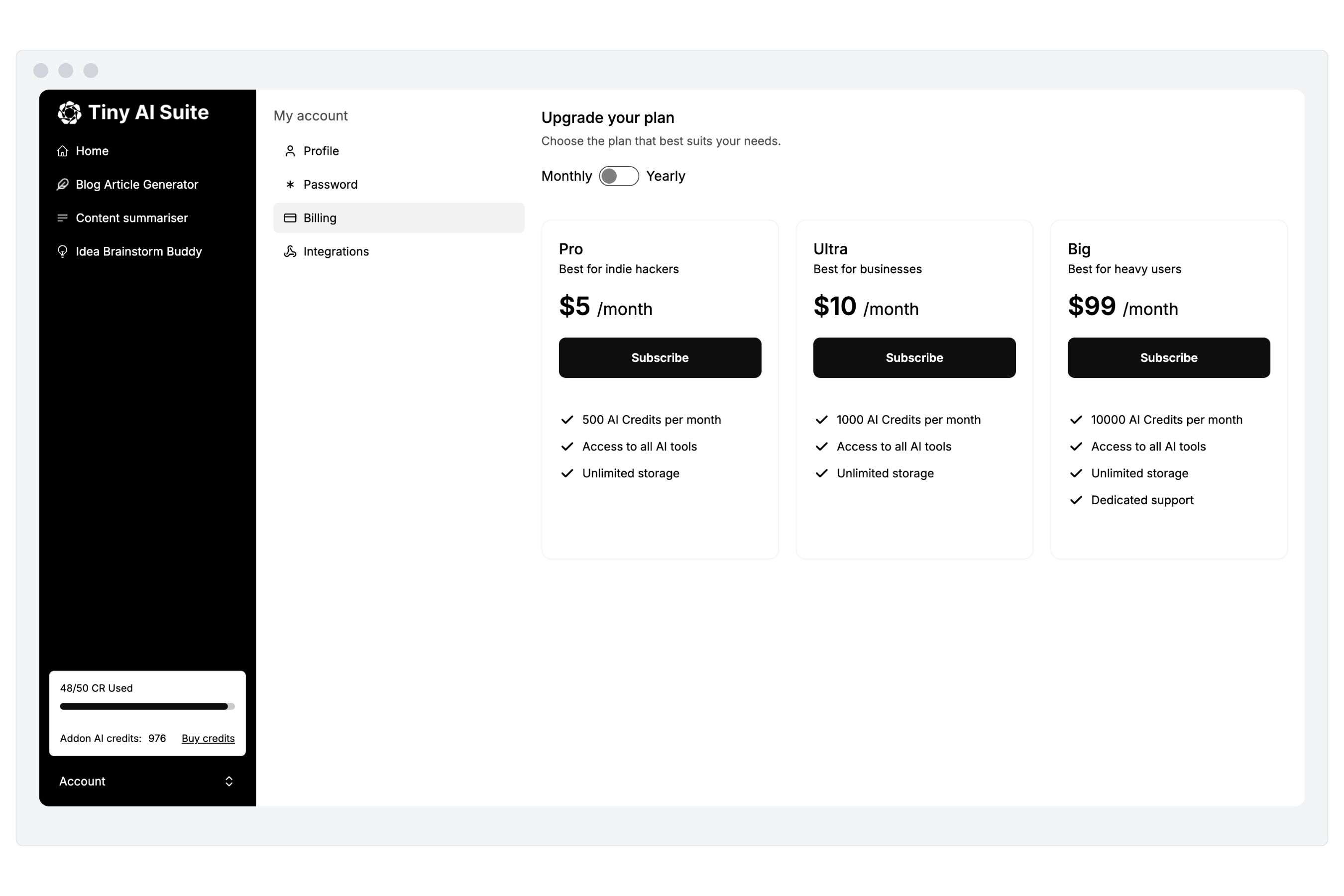Build AI products powered by GPT-5 Codex or Gemini 2.5 Flash - no coding required
Start buildingGPT-5 Codex vs Gemini 2.5 Flash
Compare GPT-5 Codex and Gemini 2.5 Flash. Build AI products powered by either model on Appaca.
Get startedModel Comparison
| Feature | GPT-5 Codex | Gemini 2.5 Flash |
|---|---|---|
| Provider | OpenAI | |
| Model Type | text | text |
| Context Window | 400,000 tokens | 1,000,000 tokens |
| Input Cost | $1.25/ 1M tokens | $0.30/ 1M tokens |
| Output Cost | $10.00/ 1M tokens | $2.50/ 1M tokens |
Build with it | Build with GPT-5 Codex | Build with Gemini 2.5 Flash |
Build AI products powered by any model
Appaca is a platform that enables you to create AI tools and agents. Choose the best model for your product and launch to customers.
Multi-Model Support
Power your AI product with GPT-5 Codex, Gemini 2.5 Flash, or any supported model. Switch anytime.
No Infrastructure Needed
We handle all API integrations. You focus on building your AI product, not managing keys.
Launch & Monetize
Build once, sell to customers. Appaca handles payments, hosting, and scaling.
No credit card required • Build your first AI product in minutes
Strengths & Best Use Cases
GPT-5 Codex
OpenAI1. Purpose-Built for Agentic Coding
- Optimized specifically for scenarios where the model must act as an autonomous or semi-autonomous coding agent.
- Tailored for Codex workflows such as planning, editing, debugging, and multi-step tool-driven code tasks.
2. Advanced Coding Reasoning
- Extends GPT-5's higher reasoning mode to better handle complex software logic and multi-file dependencies.
- Produces more accurate, structured, and maintainable code across modern programming languages.
3. Strong Tool Use in Developer-Like Environments
- Designed for Codex's agent environment, enabling the model to:
- Read and modify files
- Follow function signatures and API contracts
- Navigate codebases with awareness of context and structure
4. Large Context Window for Full-Project Understanding
- 400,000-token context allows ingestion of:
- Entire repositories
- Multiple files at once
- Architectural descriptions
- Enables long-range reasoning across codebases rather than isolated snippets.
5. Multimodal Capability for Development Tasks
- Accepts text and image as input (great for screenshots of error logs, UI mocks, whiteboards).
- Outputs text only, focusing its output precision on code, reasoning, and documentation.
6. Continuous Snapshot Updates
- The underlying model version is regularly upgraded behind the scenes.
- Ensures developers always use the best coding-enhanced GPT-5 variant without changing model names.
7. Reliable Instruction Following
- Very strong adherence to constraints like:
- File/folder structure requirements
- Framework conventions
- Naming patterns
- Linting rules
- Makes it suitable for production coding agents.
8. Broad API Integration
- Available only in the Responses API, giving you:
- Streaming
- Structured outputs
- Function calling
- Allows creation of interactive coding tools and agent workflows with tight model control.
Gemini 2.5 Flash
Google1. Highly cost-efficient for large-scale workloads
- Extremely low input cost ($0.30/M) and affordable output cost.
- Built for production environments where throughput and budget matter.
- Significantly cheaper than competitors like o4-mini, Claude Sonnet, and Grok on text workloads.
2. Fast performance optimized for everyday tasks
- Ideal for summarization, chat, extraction, classification, captioning, and lightweight reasoning.
- Designed as a high-speed “workhorse model” for apps that require low latency.
3. Built-in “thinking budget” control
- Adjustable reasoning depth lets developers trade off latency vs. accuracy.
- Enables dynamic cost management for large agent systems.
4. Native multimodality across all major formats
- Inputs: text, images, video, audio, PDFs.
- Outputs: text + native audio synthesis (24 languages with the same voice).
- Great for conversational agents, voice interfaces, multimodal analysis, and captioning.
5. Industry-leading long context window
- 1,000,000 token context window.
- Supports long documents, multi-file processing, large datasets, and long multimedia sequences.
- Stronger MRCR long-context performance vs previous Flash models.
6. Native audio generation and multilingual conversation
- High-quality, expressive audio output with natural prosody.
- Style control for tones, accents, and emotional delivery.
- Noise-aware speech understanding for real-world conditions.
7. Strong benchmark performance for its cost
- 11% on Humanity's Last Exam (no tools) - competitive with Grok and Claude.
- 82.8% on GPQA diamond (science reasoning).
- 72.0% on AIME 2025 single-attempt math.
- Excellent multimodal reasoning (79.7% on MMMU).
- Leading long-context performance in its price tier.
8. Capable coding assistance
- 63.9% on LiveCodeBench (single attempt).
- 61.9%/56.7% on Aider Polyglot (whole/diff).
- Agentic coding support + tool use + function calling.
9. Fully supports tool integration
- Function calling.
- Structured outputs.
- Search-as-a-tool.
- Code execution (via Google Antigravity / Gemini API environments).
10. Production-ready availability
- Available in: Gemini App, Google AI Studio, Gemini API, Vertex AI, Live API.
- General availability (GA) with stable endpoints and documentation.
Prompts to Get Started
Use these prompts to power AI products you build on Appaca. Each works great with the models above.
Best for GPT-5 Codex
textCreate Wealth Plan
Create a comprehensive wealth plan with this AI prompt, embodying Victor Sterling's analytical approach to strategic investing and wealth management.
Customer Retention Strategy (Loyalty + Expansion)
Develop a retention strategy that reinforces your USP, improves customer outcomes, and responds to evolving persona challenges.
Sales Objection Flipper: Reveal Hidden Pain Points
Convert common sales objections into underlying fears and create educational content ideas that overcome them before the sales call.
Best for Gemini 2.5 Flash
textLand Use Ideas Brainstorm (Increase Perceived Value)
Brainstorm unique, buyer-friendly land use ideas based on zoning, topography, and nearby attractions to boost perceived value.
Develop a Legal Strategy (Risks, Benefits, Alternatives)
Evaluate a proposed legal strategy with risks, benefits, alternatives, and a decision framework.
Cold Call Objection Handler (3 Script Styles)
Generate three distinct objection-handling scripts for real estate cold calls: empathetic, data-driven, and direct-plus follow-up questions and next steps.
What AI product will you build?
Describe your AI product idea and Appaca will help you create it - powered by GPT-5 Codex, Gemini 2.5 Flash, or any model you choose.
Free to start • No coding required • Launch to customers
See how Appaca works
Turn your AI ideas into AI products with the right AI model
Appaca is the complete platform for building AI agents, automations, and customer-facing interfaces. No coding required.

Customer-facing Interface
Create and style user interfaces for your AI agents and tools easily according to your brand.

Multimodel LLMs
Create, manage, and deploy custom AI models for text, image, and audio - trained on your own knowledge base.

Agentic workflows and integrations
Create a workflow for your AI agents and tools to perform tasks and integrations with third-party services.
Trusted by incredible people at
All you need to launch and sell your AI products with the right AI model
Appaca provides out-of-the-box solutions your AI apps need.
Monetize your AI
Sell your AI agents and tools as a complete product with subscription and AI credits billing. Generate revenue for your busienss.


“I've built with various AI tools and have found Appaca to be the most efficient and user-friendly solution.”

Cheyanne Carter
Founder & CEO, Edubuddy
Frequently Asked Questions
We are here to help!
Build AI products powered by GPT-5 Codex or Gemini 2.5 Flash
Create AI tools and agents on Appaca. Choose your model, build your product, launch to customers.